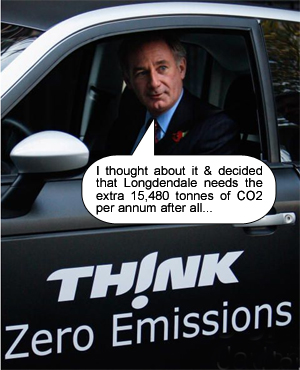 And now here's the news you needed to make you chuck up your Xmas dinner. We have some answers about what took place at the 'Hoongate' meeting last month. The implications for the future of this road scheme are massive.
And now here's the news you needed to make you chuck up your Xmas dinner. We have some answers about what took place at the 'Hoongate' meeting last month. The implications for the future of this road scheme are massive.Keen readers of the local press may have noticed a press release from Friends of the Peak District over the past week or so. Along with the Campaign for National Parks, they have demanded to know how alternatives have been rejected (as was the line from Tom Levitt) when the Public Inquiry has not yet had chance to examine them, and they also accuse Geoff Who? of breaking the Governments Ministerial Code by 'jumping the gun'.
But now leading Objector John Hall has passed to us notes from the Hoongate meeting, which can be viewed here. They reveal the 'official' version of events, which we'll now try to elucidate.
Firstly, it's clear from the text that Tom Levitt has shot his bolt by stating all the guff about the Glossop Spur. For the DfT officials, the Spur is clearly so unimportant that it's not even appeared in the notes. As usual, Levitt makes a complete fool of himself.
The main complaint begins in paragraph 5, where Roy Oldham makes it clear that the big problem for the pro-road lobbyists is the cost escalation. Oldham believes the estimated costs are too high when compared with other schemes, although it was pointed out to him by Highways Agency officials present that the cheaper schemes he used as an example are not really comparable, which shows how ignorant he is.
Hoon then offered to turn the Inquiry process on it's head - paragraph 6 says that he offered to detrunk the existing road - this demonstrates that he is clearly partial and implicated now in this whole mucky, cruddy business. The current proposals for the bypass envisage that detrunking - a shifting of responsibility for the road from the Highways Agency to the Local Authorities - would take place after the bypass had been built. The fact that the A628 and A57 are a Trunk road is also one of the principle reasons thrown up by the pro-road lobby as to why a lorry ban is not possible.
So we can only assume that Hoon's offer to detrunk the road now means that a Lorry Ban is more possible now than it has ever been. If it's that easy to remove problems, then there's no excuse not to try it.
The implication of Hoon's offer is that if the responsibility for the road is handed to local authorities, then they can also have the responsibility for funding and constructing a bypass. Whether or not this makes a bypass more or less likely is a point we'll surely return to if Hoon's offer is serious.
In paragraph 7, Purnell discounts alternative routes, after Hoon asked for views on them. This makes it clear that Hoon is asking the opinion of politicians before the case for alternatives have been put to the Inquiry, and before Hoon's agency - the Highways Agency - have rebutted any evidence put before them for alternative routes.
And in paragraph 8, Hoon is said to be 'awaiting formal advice from the relevant regional authorities before making a decision and when he had received that in the coming weeks he would be considering the best way forward'.
With the release of this news, John Watson the Inquiry Inspector must wonder exactly what his role is. It's clear now for all to see that the key decisions are being made outside the Inquiry, and the politicians are completely brazen about it. Not only are the Highways Agency wasting the time and money of the public with their delaying tactics and not only is the Public Inquiry clearly a complete sham, but the politicians have no intention of even listening to the alternative point of view.
That's fine - it confirms what we knew all along: they want a road, not alternatives.
But they need to be clear about the implications of making such aggressive moves. If Hoon wants to launch a war on the environment in Glossopdale and Longdendale in the same fashion as he launched the Iraq war - i.e without consultation, without listening to other points of view, in a pre-emptive manner - then he can expect a suitable response.

No comments:
Post a Comment